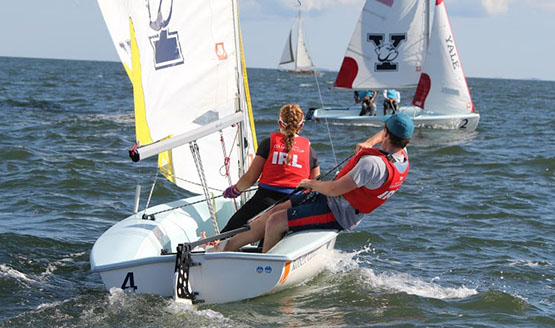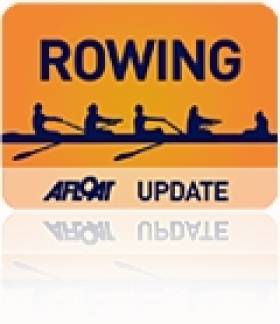Displaying items by tag: Dublin University
Trinity & UCD Contest Student Yachting World Cup
Two Dublin University Sailing teams are competing in this week's 35th edition of the Student Yachting World Cup (SYWoC) that began in France today. Both Dublin University (Trinity) and UCD Sailing Clubs return to France for the highlight of the Student sailing calendar. UCD return for the fourth time in a row and as previous winners from 2012. Trinity earned the invite to La Baule – Le Pouliguen in recognition of its 'consistent performance at Student Yachting Nationals' as well as being 2006 Cup holders.
This year’s event will be sailed using J80’s and involves a coastal leg along with the scheduled inshore races.
Up to 20 teams are taking part including the University of Southampton (England), the Ecole polytechnique fédérale de Lausanne (Switzerland), and the University of Brescia (Italy).
The event has been taking place since 1979 and is seen as the most prestigious keelboat competition in the student sailing calendar.
The UCD team for this year consists of Ryan Glynn (Skipper), Ronan Jones, Colin O’Mahoney, Cliodhna Conolly, Cian Cahill and Emma Reidy.
Irish University Sailing Team Sixth in Collegiate Cup Regatta
As students prepare to head back to school, the Irish Collegiate Sailing Team is celebrating recent success in one of it’s first U.S. regattas of the season; the Laser Performance Collegiate Cup, sailed in 420 dinghies last week.
The regatta, which kicked off on the 25th of August on Long Island Sound in Connecticut, USA, consisted of eight teams from around the world who all came to attend what is considered the first collegiate level international regatta with both team and fleet racing components. The regatta, organised by LaserPerformance and sponsored by FitAid and Redbull, was generously hosted by the Yale Corinthian Yacht Club, who provided the boats.

The first two days of the event were set aside as coached clinics so that the sailors could get used to the new boats and practice their team racing skills, a sector of competitive sailing that several of the sailors were experiencing for the first time. Among these coaches was Anna Tunnicliffe, four time U.S. Sailing’s Rolex Yachtswoman of the Year and 2008 Olympic Gold Medalist in the Laser Radial Class, among other titles. Irish sailor Caoimhe Tyndall commented, “Anna's professional instruction proved to be extremely beneficial, as each sailor noticeably improved as the regatta progressed…Anna provided the competitors with an immense amount of sailing knowledge.”
Both clinic days started out with 5-7 knots from the west and eventually shifted around to the south, building to 10-15 knots. The Irish Team felt that this was the perfect wind for team racing and were able to get some good quality races off, especially against the ever competitive Italians.
UCD Rowers Win Terrific Gannon Cup Race
#ROWING: UCD won the Gannon Cup for senior men after a terrific struggle, while Trinity senior women took the Corcoran Cup in facile fashion at the Colours Rowing Races on the Liffey today.
Trinity’s crew led the Gannon Cup race from just after the start, but could not gain a clearwater lead. UCD’s pushes were relentless, and though they were still behind coming through the final bridge, Watling Street, they then powered through and had command of the race when Trinity’s number four man and captain, Luke Acheson, collapsed. The race was not rowed out. It took a long time – too long - to get Acheson into an ambulance, as he had to be brought up the river all the way to City Quay before being lifted up the steps. He was being treated in St James’s Hospital this afternoon.
Trinity’s Corcoran Cup crew demonstrated that size is not everything in rowing. They were outsiders, but simply rowed better than UCD. They eked out an early lead and built it steadily into an unassailable margin by the end.
UCD’s annexation of the Sally Moorhead Trophy for novice women was also one-sided, but Trinity took the novice men’s title after UCD suffered a boat-stopping crab right in front of the Four Courts. UCD came back to lead briefly, but Trinity took control again before the finish.
Colours Rowing Races, O’Connell Bridge to St James’s Gate
Men – Senior (Gannon Cup): UCD (M Bailey, W Yeomans, C O’Riada, B Crosse, D O’Neill, A Griffin, P Moore, N Kenny (stroke); cox: L Mulvihill) bt Trinity not rowed out. Novice (Dan Quinn Shield): Trinity bt UCD 1 ½ l.
Women – Senior (Corcoran Cup): Trinity (G Crowe, H O’Neill, H McCarthy, R Deasy, S O’Brien, A Leahy, S Cass, R Morris (stroke); cox: N Williams) bt UCD easily.
Novice (Sally Moorhead Trophy): UCD bt Trinity easily.





























































